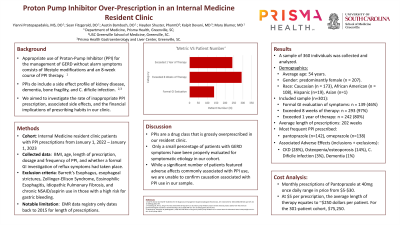Sunday Poster Session
Category: Practice Management
P1218 - Proton Pump Inhibitor (PPI) Over-Prescription in an Internal Medicine Resident Clinic
Sunday, October 22, 2023
3:30 PM - 7:00 PM PT
Location: Exhibit Hall

Has Audio

Yianni Protopapadakis, MS, DO
Prisma Health System
Greenville, SC
Presenting Author(s)
Yianni Protopapadakis, MS, DO1, Sean Fitzgerald, DO1, Hayden Shuster, PharmD1, Cameron Keramati, BS2, Kalpit Devani, MD3, Mary Blumer, MD1
1Prisma Health System, Greenville, SC; 2University of South Carolina School of Medicine-Greenville, Greenville, SC; 3Prisma Health Upstate, Greenville, SC
Introduction: Appropriate use of Proton Pump Inhibitor (PPI) therapy consists of an 8-week limited-time trial according to ACG guidelines. Due to patient symptomatic relief, PPI prescription length is often extended beyond the recommended therapy window without additional evaluation of symptoms. Despite their acceptance as safe medications, the adverse effect (AE) profile of PPI therapy has been increasingly documented. We aimed to investigate the rate of inappropriate PPI prescriptions, associated adverse events, and the financial implications of prescribing practices in our resident clinic.
Methods: The Prisma Health IM residency clinic database was analyzed for active PPI prescriptions between 1/1/22 – 1/1/23. Data collected included: age, BMI, length of prescription, dosage and frequency of PPI, formal GI investigation of GERD symptoms, associated adverse effects. Adverse effects (AE) included osteopenia/osteoporosis, Clostridium Dificile infection, dementia, chronic kidney disease. Exclusion criteria consisted of Barrett’s Esophagus, esophageal strictures, Zollinger-Ellison Syndrome, Eosinophilic Esophagitis, Idiopathic Pulmonary Fibrosis, and chronic NSAID/aspirin use in those with a high risk for gastric bleeding.
Results: A preliminary sample of 100 individuals was collected. Average age was 56 years with female gender predominance (n=76). Racial distribution was white (n=51), black/AA (n=49), and Hispanic (n=1).
Within the included sample (n=85/100), 39 patients had a formal GI evaluation of their symptoms. All 85 patients exceeded the recommended 8-week trial. One year of therapy was exceeded in 60 patients. The average prescription length was 214 weeks. The most frequently prescribed PPI was pantoprazole.
AE Occurrence Rates: Chronic kidney disease (n=15), osteopenia/osteoporosis (n=14), C. Dificile infection (n=8), and dementia (n=0).
Discussion: These results confirm that PPI therapy has been perpetuated at an immense rate within our patient population. While commonly associated adverse effects were noted, we are unable to attribute these to PPI use with the presently available data.
Since our clinic features a majorly uninsured population, a cost analysis of our most prescribed PPI was performed. 30-day prescription at 40mg daily ranged from $5-30 monthly. At the lowest cost ($5), the average length of prescription for one patient would total $268. For the entire 85 patient cohort, $22,700. Extrapolated across our 500-patient cohort, the collective payor-burden equates to ~$134,000.
Disclosures:
Yianni Protopapadakis, MS, DO1, Sean Fitzgerald, DO1, Hayden Shuster, PharmD1, Cameron Keramati, BS2, Kalpit Devani, MD3, Mary Blumer, MD1. P1218 - Proton Pump Inhibitor (PPI) Over-Prescription in an Internal Medicine Resident Clinic, ACG 2023 Annual Scientific Meeting Abstracts. Vancouver, BC, Canada: American College of Gastroenterology.
1Prisma Health System, Greenville, SC; 2University of South Carolina School of Medicine-Greenville, Greenville, SC; 3Prisma Health Upstate, Greenville, SC
Introduction: Appropriate use of Proton Pump Inhibitor (PPI) therapy consists of an 8-week limited-time trial according to ACG guidelines. Due to patient symptomatic relief, PPI prescription length is often extended beyond the recommended therapy window without additional evaluation of symptoms. Despite their acceptance as safe medications, the adverse effect (AE) profile of PPI therapy has been increasingly documented. We aimed to investigate the rate of inappropriate PPI prescriptions, associated adverse events, and the financial implications of prescribing practices in our resident clinic.
Methods: The Prisma Health IM residency clinic database was analyzed for active PPI prescriptions between 1/1/22 – 1/1/23. Data collected included: age, BMI, length of prescription, dosage and frequency of PPI, formal GI investigation of GERD symptoms, associated adverse effects. Adverse effects (AE) included osteopenia/osteoporosis, Clostridium Dificile infection, dementia, chronic kidney disease. Exclusion criteria consisted of Barrett’s Esophagus, esophageal strictures, Zollinger-Ellison Syndrome, Eosinophilic Esophagitis, Idiopathic Pulmonary Fibrosis, and chronic NSAID/aspirin use in those with a high risk for gastric bleeding.
Results: A preliminary sample of 100 individuals was collected. Average age was 56 years with female gender predominance (n=76). Racial distribution was white (n=51), black/AA (n=49), and Hispanic (n=1).
Within the included sample (n=85/100), 39 patients had a formal GI evaluation of their symptoms. All 85 patients exceeded the recommended 8-week trial. One year of therapy was exceeded in 60 patients. The average prescription length was 214 weeks. The most frequently prescribed PPI was pantoprazole.
AE Occurrence Rates: Chronic kidney disease (n=15), osteopenia/osteoporosis (n=14), C. Dificile infection (n=8), and dementia (n=0).
Discussion: These results confirm that PPI therapy has been perpetuated at an immense rate within our patient population. While commonly associated adverse effects were noted, we are unable to attribute these to PPI use with the presently available data.
Since our clinic features a majorly uninsured population, a cost analysis of our most prescribed PPI was performed. 30-day prescription at 40mg daily ranged from $5-30 monthly. At the lowest cost ($5), the average length of prescription for one patient would total $268. For the entire 85 patient cohort, $22,700. Extrapolated across our 500-patient cohort, the collective payor-burden equates to ~$134,000.
Disclosures:
Yianni Protopapadakis indicated no relevant financial relationships.
Sean Fitzgerald indicated no relevant financial relationships.
Hayden Shuster indicated no relevant financial relationships.
Cameron Keramati indicated no relevant financial relationships.
Kalpit Devani indicated no relevant financial relationships.
Mary Blumer indicated no relevant financial relationships.
Yianni Protopapadakis, MS, DO1, Sean Fitzgerald, DO1, Hayden Shuster, PharmD1, Cameron Keramati, BS2, Kalpit Devani, MD3, Mary Blumer, MD1. P1218 - Proton Pump Inhibitor (PPI) Over-Prescription in an Internal Medicine Resident Clinic, ACG 2023 Annual Scientific Meeting Abstracts. Vancouver, BC, Canada: American College of Gastroenterology.

